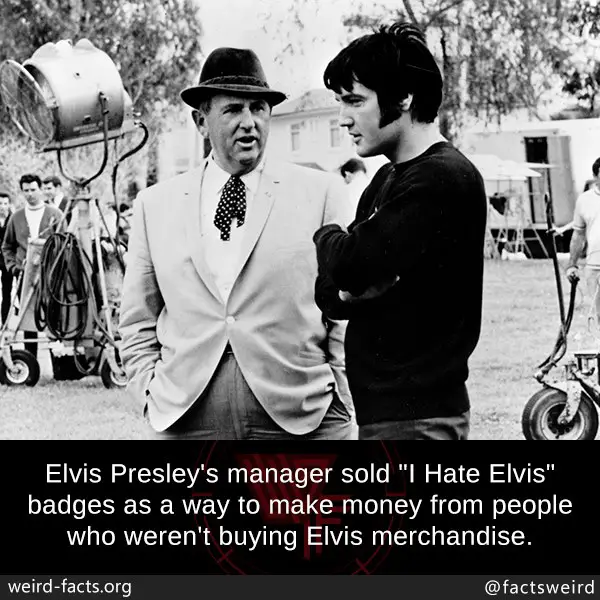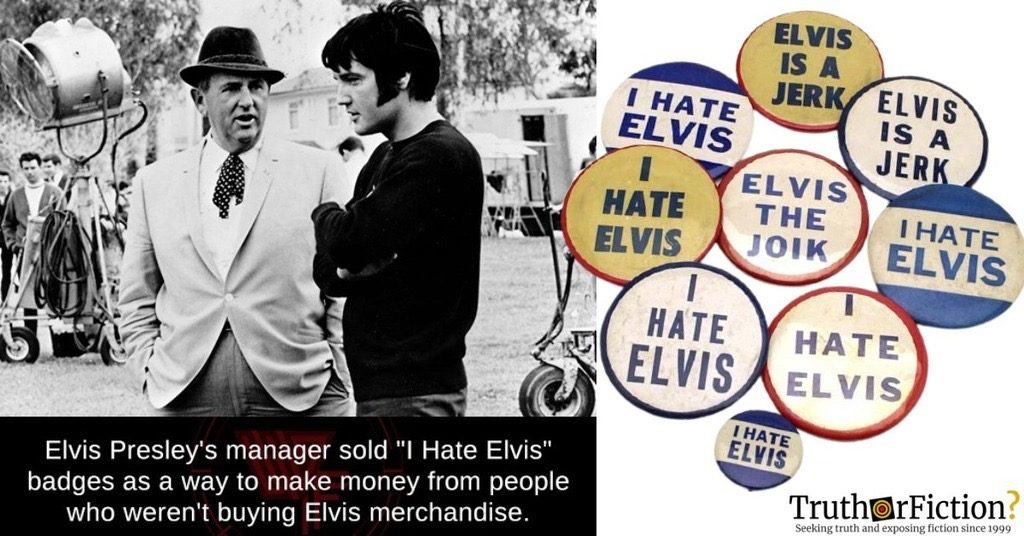On August 23 2021, the Facebook page “Weird Facts” shared the following meme, which asserted that Elvis Presley’s manager did pro-Elvis and anti-Elvis marketing, selling “I Hate Elvis” buttons to individuals who were not fans of the singer:

Underneath a black-and-white image of Presley and another individual, text read:
Elvis Presley’s manager sold “I hate Elvis” badges as a way to make money from people who weren’t buying Elvis merchandise.
No citation was included with the post, which was virally popular. A quick search indicated that the “I hate Elvis” merchandise claim appeared on Reddit’s r/todayilearned in 2019 and in 2015:
Both posts linked to a Wikipedia page for Colonel Tom Parker, Elvis’ manager. An introduction on the page initially described Parker as an aggressive representative and marketer from the very beginning:
Parker discovered the then-unknown Elvis Presley in 1955. He maneuvered himself to become Presley’s sole representative. Within months, he had won him a recording contract with the RCA Victor record label. This led to Presley having a commercial breakthrough in 1956 with his first single “Heartbreak Hotel” and rising to become one of the most popular and commercially successful entertainers in the world. Parker was able to receive more than half of the income from the enterprise, an unprecedented figure for a music manager. He negotiated Presley’s lucrative merchandising deals, TV appearances, and acting roles in film musicals. He turned down offers to allow Presley to tour overseas, probably due to his status as an illegal immigrant, which would have been exposed had he consented for Elvis to go abroad. He also influenced Presley’s personal life, including Presley’s decisions to accept military service in 1958 and to marry Priscilla Beaulieu in 1967. The film musicals became the focus of Presley’s career during his commercial decline in the 1960s, until his 1968 comeback and return to touring. Parker rarely saw him after that, but continued in his management role until Presley’s death in 1977.
A section titled “Managing Elvis” mentioned the anti-Elvis items:
Parker signed a merchandising deal with Beverly Hills film merchandiser Hank Saperstein for nearly $40,000 to turn Presley into a brand name. With over 78 different ranges, from charm bracelets to record players, Presley merchandise had brought in $22 million by the end of 1956. Parker, with his 25% share of profits, was finding many new ways to make money from his artist that managers before him could only have dreamed about. He had even come up with the idea to market “I Hate Elvis” badges to make money from those who otherwise wouldn’t have parted with their cash.
That section cited a definitive 2001 book, The Colonel (The True Story of Colonel Tom Parker and Elvis Presley), as a source for the claim. On page 125, author Alanna Nash mentioned the “I Hate Elvis” buttons in passing:

The passage broadly addressed Parker’s general approach to managing Elvis, sometimes territorially, saying:
Parker, who tied on a vendor’s apron to peddle both I LOVE ELVIS and I HATE ELVIS buttons to folks who reacted strongly one way or another, didn’t care what the newsmen said as long as they said it — and paid their own admission to the shows. Not even an “Elvis is queer” story got his feathers up. When Gabe Tucker threw just such a magazine piece on his desk, Parker didn’t say a word until his friend stopped sputtering. “Well,” Parker finally said, “did they spell his name right?”
The aggressive marketing campaigns — which were unprecedented at that time — are more understandable when considering the amount of money Elvis Presley was commanding at the height of his fame:
The Wall Street Journal reported that by the end of 1957, Elvis merchandise had grossed over $22 million dollars.
By 1962, Colonel Parker’s share of that booty would become an eye-popping 50%.
His most ingenious product, though, was “I Hate Elvis” buttons. The Colonel even made money from people who despised his hip-swivelling star.
When Elvis went into the army for a two-year posting in 1958, this sustained merchandise marketing helped keep his image alive. When he returned in 1960, it was as if Elvis hadn’t skipped a beat.
The buttons are still fairly easy to find on vintage and collectors‘ sites.
A viral Facebook post claimed that Elvis’ manager sold “I hate Elvis” badges (more commonly called “buttons”) as a means to capitalize further on Elvis’ notoriety. Although the claim was typically unsupported when it was referenced, it appeared as early as Nash’s 2001 biography of Parker. In the passage about the “I hate Elvis” buttons, Nash indicated Parker considered any press to be good press.
- Elvis Presley's manager sold 'I hate Elvis' badges as a way to make money from people who weren't buying Elvis merchandise. | Weird Facts/Facebook
- TIL That Elvis Presley's manager sold "I Hate Elvis" badges as a way to make money from people who weren't buying Elvis merchandise
- TIL Elvis' manager sold "I Hate Elvis" badges to make money from those who otherwise wouldn't have parted with their cash for Elvis merchandise.
- Colonel Tom Parker
- The Colonel The True Story of Colonel Tom Parker and Elvis Presley
- The ingenious way Elvis Presley even made money off his haters

